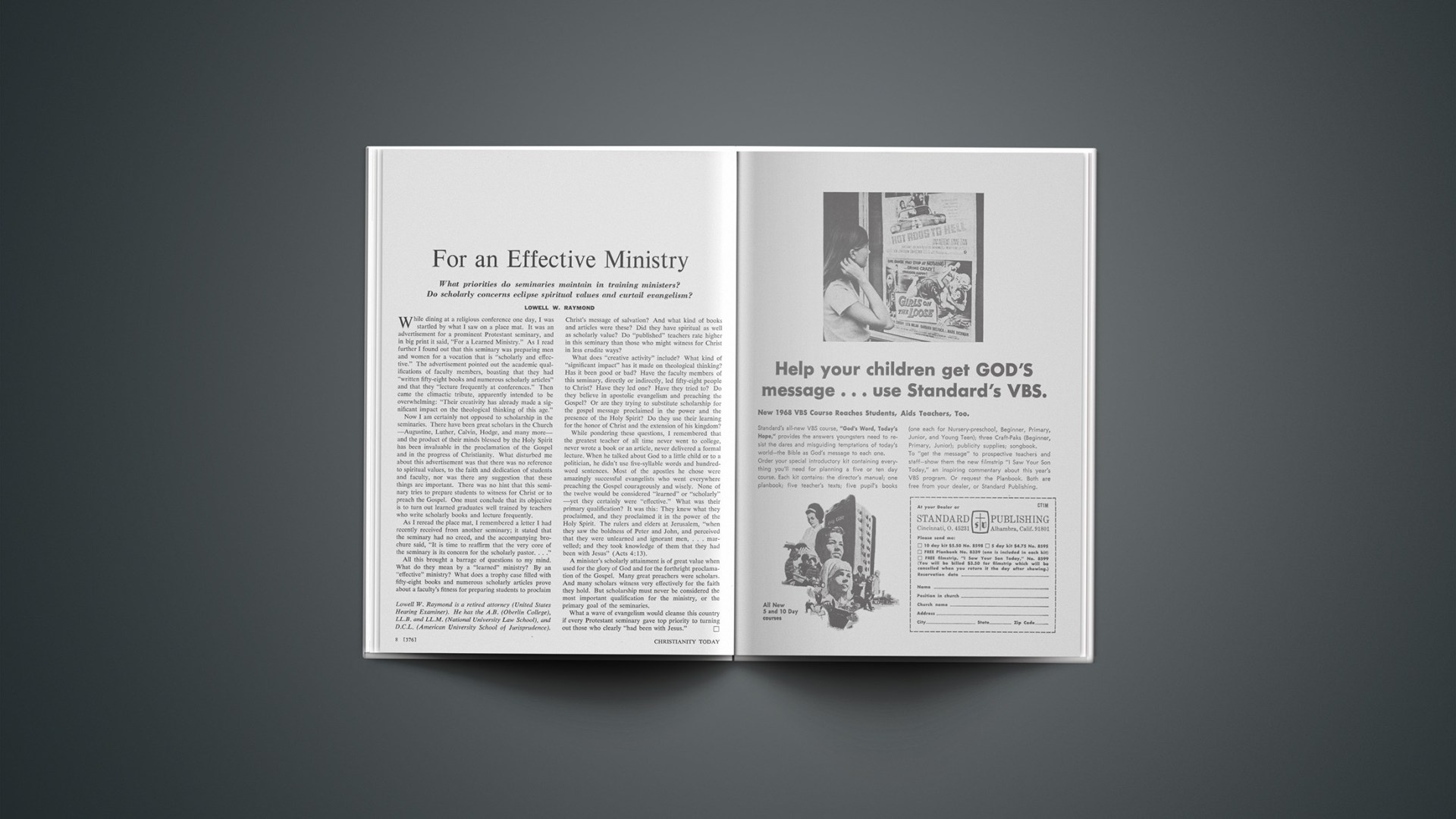What priorities do seminaries maintain in training ministers? Do scholarly concerns eclipse spiritual values and curtail evangelism?
While dining at a religious conference one day, I was startled by what I saw on a place mat. It was an advertisement for a prominent Protestant seminary, and in big print it said, “For a Learned Ministry.” As I read further I found out that this seminary was preparing men and women for a vocation that is “scholarly and effective.” The advertisement pointed out the academic qualifications of faculty members, boasting that they had “written fifty-eight books and numerous scholarly articles” and that they “lecture frequently at conferences.” Then came the climactic tribute, apparently intended to be overwhelming: “Their creativity has already made a significant impact on the theological thinking of this age.”
Now I am certainly not opposed to scholarship in the seminaries. There have been great scholars in the Church—Augustine, Luther, Calvin, Hodge, and many more—and the product of their minds blessed by the Holy Spirit has been invaluable in the proclamation of the Gospel and in the progress of Christianity. What disturbed me about this advertisement was that there was no reference to spiritual values, to the faith and dedication of students and faculty, nor was there any suggestion that these things are important. There was no hint that this seminary tries to prepare students to witness for Christ or to preach the Gospel. One must conclude that its objective is to turn out learned graduates well trained by teachers who write scholarly books and lecture frequently.
As I reread the place mat, I remembered a letter I had recently received from another seminary; it stated that the seminary had no creed, and the accompanying brochure said, “It is time to reaffirm that the very core of the seminary is its concern for the scholarly pastor.…” All this brought a barrage of questions to my mind. What do they mean by a “learned” ministry? By an “effective” ministry? What does a trophy case filled with fifty-eight books and numerous scholarly articles prove about a faculty’s fitness for preparing students to proclaim Christ’s message of salvation? And what kind of books and articles were these? Did they have spiritual as well as scholarly value? Do “published” teachers rate higher in this seminary than those who might witness for Christ in less erudite ways?
What does “creative activity” include? What kind of “significant impact” has it made on theological thinking? Has it been good or bad? Have the faculty members of this seminary, directly or indirectly, led fifty-eight people to Christ? Have they led one? Have they tried to? Do they believe in apostolic evangelism and preaching the Gospel? Or are they trying to substitute scholarship for the gospel message proclaimed in the power and the presence of the Holy Spirit? Do they use their learning for the honor of Christ and the extension of his kingdom?
While pondering these questions, I remembered that the greatest teacher of all time never went to college, never wrote a book or an article, never delivered a formal lecture. When he talked about God to a little child or to a politician, he didn’t use five-syllable words and hundred-word sentences. Most of the apostles he chose were amazingly successful evangelists who went everywhere preaching the Gospel courageously and wisely. None of the twelve would be considered “learned” or “scholarly”—yet they certainly were “effective.” What was their primary qualification? It was this: They knew what they proclaimed, and they proclaimed it in the power of the Holy Spirit. The rulers and elders at Jerusalem, “when they saw the boldness of Peter and John, and perceived that they were unlearned and ignorant men, … marvelled; and they took knowledge of them that they had been with Jesus” (Acts 4:13).
A minister’s scholarly attainment is of great value when used for the glory of God and for the forthright proclamation of the Gospel. Many great preachers were scholars. And many scholars witness very effectively for the faith they hold. But scholarship must never be considered the most important qualification for the ministry, or the primary goal of the seminaries.
What a wave of evangelism would cleanse this country if every Protestant seminary gave top priority to turning out those who clearly “had been with Jesus.”
Milton D. Hunnex is professor and head of the department of philosophy at Willamette University, Salem, Oregon. He received the B.A. and M.A. degrees from the University of Redlands and the Ph.D. in the Inter-collegiate Program in Graduate Studies, Claremont, California. He is author of “Philosophies and Philosophers.”










